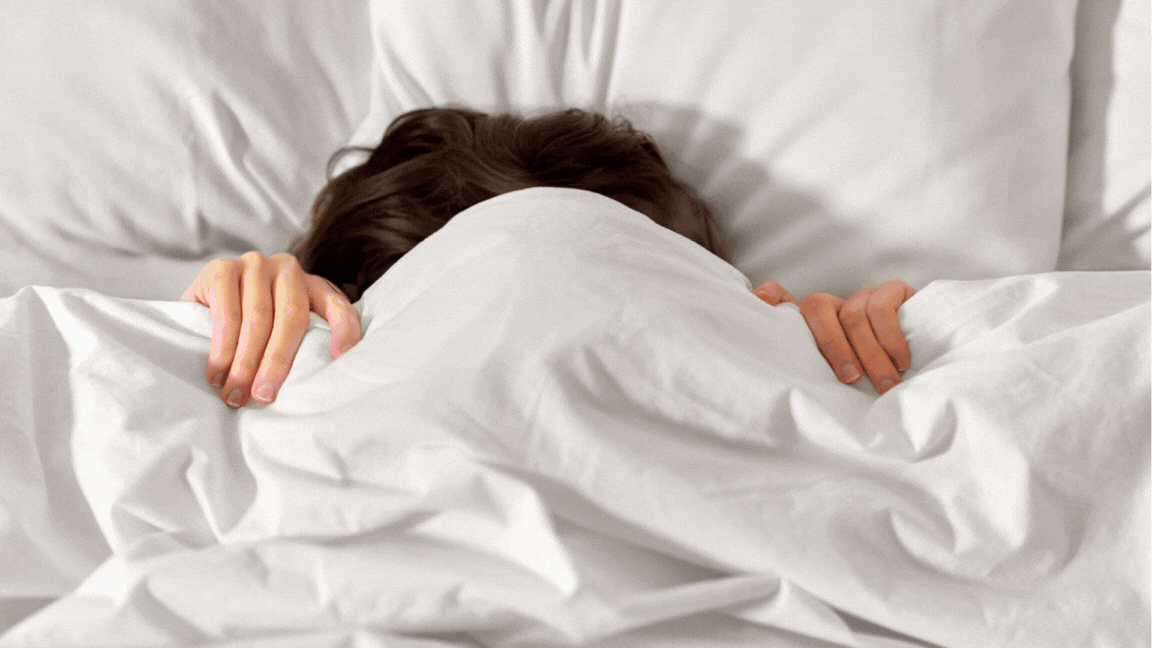Tired but Can’t Sleep? How To Calm Your Mind and Get More Zs

We’ve all been there—tossing and turning, staring at the ceiling, wondering why sleep remains elusive despite feeling utterly exhausted. Insomnia can be incredibly frustrating and confusing, leaving us desperate for answers. I remember when a client once told me, “I’m tired but can’t sleep. Why can’t I just fall asleep?”
This sentiment is all too common among those struggling with insomnia. It’s a perplexing cycle of fatigue and wakefulness that can stretch on for weeks, months, or even years. Let’s explore the reasons behind this baffling phenomenon and understand what might be keeping you awake at night.
Insomnia isn’t just about being tired; it’s about how our behaviors and routines can inadvertently condition our brains to stay awake. So, if you’ve ever found yourself wide awake despite being dead tired, you’re not alone. Let’s dive into the intricacies of why this happens and explore some practical solutions to help you reclaim your nights and your sleep.
The Role of Conditioning in Insomnia
One of the key reasons why people struggle to sleep despite feeling exhausted is due to conditioning. This isn’t the kind of conditioning that involves running laps or lifting weights; it’s about how our brains associate certain environments and routines with specific states, like wakefulness or sleep. Over time, poor sleep behaviors can condition your brain to stay awake when you’re in bed.
Imagine this: you’re lying in bed, trying to sleep, but instead, you’re tossing and turning, feeling anxious or even wired. The more time you spend awake in bed, the stronger the association becomes between your bed and wakefulness. Your brain starts to link the bed with being awake rather than sleeping. This is why you might feel wide awake as soon as you hit the pillow, even though you were exhausted just moments before.
This kind of conditioning happens gradually. Initially, you might have a few nights where you can’t sleep, leading to anxiety about sleep. This anxiety makes it harder to sleep, and before you know it, a cycle is established. The bed becomes a place of stress and wakefulness rather than rest and relaxation.
Inconsistent Sleep Schedules
Another major factor contributing to insomnia is an inconsistent sleep schedule. Our bodies thrive on routine, and our sleep-wake cycle is no different. When you go to bed and wake up at different times each day, your internal clock gets confused. This inconsistency can make it difficult to fall asleep when you want to, because your body isn’t sure when it’s supposed to be awake or asleep.
For example, if you sleep in on weekends to catch up on lost sleep during the week, you might feel better temporarily, but you’re also shifting your body’s internal clock. When Sunday night rolls around, you might find it difficult to fall asleep at your usual time because you’ve thrown off your rhythm by sleeping in. This irregularity can lead to a buildup of sleep pressure—our body’s need for sleep—that doesn’t align with your bedtime, making it harder to fall asleep.
|
Sleep Pressure and Napping
Sleep pressure is another important concept to understand. Sleep pressure builds up throughout the day, peaking in the evening when it’s time for bed. If you take long naps during the day, you reduce this sleep pressure, making it harder to fall asleep at night. Naps can be refreshing, but if they’re too long or taken too late in the day, they can interfere with your nighttime sleep.
Think of sleep pressure as a balloon that gradually inflates throughout the day. By the time night falls, the balloon is fully inflated, signaling that it’s time to sleep. If you nap during the day, you’re letting some air out of the balloon, reducing that pressure and making it harder to fall asleep when bedtime comes.
|
Poor Sleep Habits
Stress and anxiety are common culprits behind insomnia. When your mind is racing with worries and to-do lists, it’s hard to relax enough to fall asleep. This can create a vicious cycle: you’re anxious about not sleeping, which makes it harder to sleep, leading to more anxiety.
Sometimes, it’s the small habits that add up to big sleep problems. Drinking caffeine late in the day, eating heavy meals close to bedtime, or not getting enough physical activity can all contribute to insomnia. Caffeine, for instance, can stay in your system for hours, making it difficult to fall asleep if consumed too late in the day.
|
Understanding and Addressing Insomnia
Understanding the underlying reasons for insomnia is the first step toward overcoming it. By recognizing the role of conditioning, maintaining a consistent sleep schedule, managing sleep pressure, reducing anxiety, and improving sleep habits, you can begin to break the cycle of sleeplessness.
Insomnia is not a sign that something is fundamentally wrong with you; it’s often the result of unintentional habits and behaviors that can be changed. The journey to better sleep may require some adjustments and patience, but it’s entirely possible with the right approach.
If you’ve tried these strategies and still struggle with insomnia, it might be time to seek help from a healthcare professional. Sometimes, underlying medical conditions or psychological issues can contribute to sleep problems, and addressing these can pave the way for better sleep.
Why Trust Us?
At The Sleeping Institute, we're dedicated to transparency, impartiality, and accuracy in every article we publish. Our reviews are based on comprehensive analysis and firsthand experience. Staying current with the latest advancements in sleep technology, we offer up-to-date, reliable, and unbiased information to help you make informed decisions for a better night's rest. Let us be your trusted guide in the ever-evolving world of sleep technology!